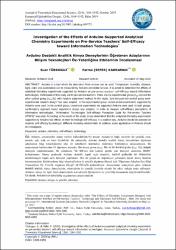Investigation of the effects of arduino-supported analytical chemistry experiments on pre-service teachers' self-efficacy toward information technologies
Citation
Türkoğuz, S. & Sefer, F. (2019). Investigation of the Effects on Pre-Service Teachers' Self-Efficacy toward Information Technologies of Analytical Chemistry Experiences Supported by Arduino . Journal of Theoretical Educational Science , 12 (4) , 1164-1192 . DOI: 10.30831/akukeg.409775Abstract
Arduino is a tool which the data taken from sensors can be used. Temperature, humidity, distance,
light, color and acceleration can be measured by Arduino connected sensors. It is aimed to determine the effects of
analytical chemistry experiments supported by Arduino on pre-service teachers’ self-efficacy toward information
technologies. Participants of this study are 61 pre-service teachers. There are one experimental group (nEG:34) and the
other control group (nCG:31) with random assignment method. In this study, "pre-test-post-test control group semiexperimental research design" has been adopted. In the experimental group, closed-ended experiments supported by
Arduino were used. In the control group, closed-end experiments not supported Arduino were used. In both groups,
confirmatory approach based experiment design was adopted. In order to measure self-efficacy perceptions of
information technologies, "Information Technologies Self-efficacy Perception Scale for Pre-service Teachers
(ITSPS)" was used. According to the results of the study, it was determined that the analytical chemistry experiments
supported by Arduino has effects on their technology self-efficacy in a positive way. Arduino should be assessed on
students' self-efficacy by testing in different chemistry-related trials. In addition, easier application of Arduino should
be investigated. Arduino, sensörlerden alınan verileri kullanılabilen bir araçtır. Arduino'ya bağlı sensörler ile sıcaklık, nem,
mesafe, ışık, renk ve ivme ölçülebilir. Bu çalışmada, Arduino destekli analitik kimya deneylerinin öğretmen
adaylarının bilgi teknolojilerine olan öz yeterlikleri üzerindeki etkilerinin belirlenmesi amaçlanmıştır. Bu
araştırmanın katılımcıları 61 öğretmen adayıdır. Bir deney grubu (nDG: 34) ve bir kontrol grubu (nKG: 31) rastgele
atamayla oluşturulmuştur. Bu çalışmada "ön test-son test kontrol gruplu yarı deneysel araştırma deseni"
kullanılmıştır. Deney grubunda Arduino destekli kapalı uçlu deneyler, kontrol grubunda ise Arduino'yu
desteklemeyen kapalı uçlu deneyler yapılmıştır. Her iki grupta da doğrulayıcı yaklaşıma dayalı deney tasarımı
benimsenmiştir. Katılımcıların bilgi teknolojilerinin öz yeterlik algılarını ölçmek için “Öğretmen Adayları İçin Bilgi
Teknolojileri Öz Yeterlik Algılama Ölçeği” (BTÖYAÖ) kullanılmıştır. Araştırmanın sonuçlarına göre, Arduino
destekli analitik kimya deneylerinin, teknolojinin öz yeterlik üzerinde olumlu bir etkisi olduğu tespit edilmiştir.
Arduino, kimya ile ilgili farklı denemelerde test edilerek öğrencilerin öz yeterliliği konusunda değerlendirilmelidir.
Ek olarak, Arduino'nun daha kolay uygulanması araştırılmalıdır.
Source
Kuramsal Eğitimbilim DergisiVolume
12Issue
4Collections
- Cilt 12 : Sayı 4 [11]



















